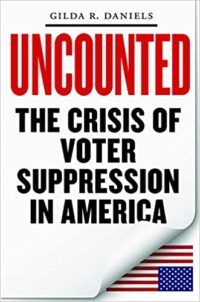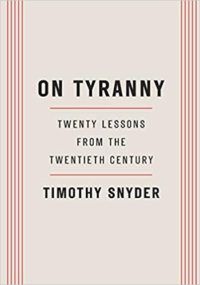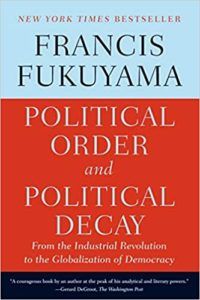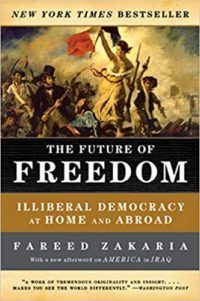There is a lot going on in 2020: a global pandemic, a worldwide shift towards populist leadership, and the oldest continuous democracy coming under threat. These threats may be dismissed as hyperbole, but a careful retracing of the cornerstones of democracy lays bare the evidence to this claim.
With the U.S. elections approaching, you may be having a lot of conversations about preferences and making the best decisions. To conduct a productive conversation with someone, it is important to educate yourself first. Here is a reading list of books about democracy in its various forms to get you started.
What Makes a Democracy?
Equality in Voting and Inclusion
Everyone has a right to vote, and effective participation in the government is the cornerstone of every democracy. The voter turnout in countries seems like a straightforward metric to assess, but is actually a complex number that is not truly representational. Many voters miss out on a chance to vote because of various dated laws or other forms of voter suppression. Here are some books on democracy to read as a refresher.
Field Notes on Democracy by Arundhati Roy
Roy is one of the toughest critics of one of the world’s thriving democracies out there: India. This is a great addition for any democracy reading list, because it dives deep into the exclusion of certain groups of people from voting through a lack of access to resources from the government. These writings are a great reminder for any democracy to constantly evolve, in order to incorporate the voices of all the people.
Uncounted: The Crisis of Voter Suppression in America by Gilda R. Daniels
This book is a fantastic introduction into how people are still to this day prevented from having their voices heard, people of color in particular. It is a great place to start to form a framework in your head about your voting plan and become more cognizant of your rights as a voter, and what is expected of you as a voter.
ACCOUNTABILITY AND GOVERNMENT OF THE PEOPLE
Another cornerstone of democracy is accountability. While the election may be won, the people who voted for them have the power to retract their support. Most democratic governments have checks and balances in place to help people voice their discontent. Sometimes all these checks and balances falter. Here are two works exploring why they tread a thin line.
On Tyranny: Twenty Lessons from the Twentieth Century by Timothy D. Snyder
In this work the author warns us against tyranny brought on by isolationism. He teaches us how to pick up on changes in the political climate around us and how to recognize the signs and symptoms of tyranny and authoritarianism. This is a great work to turn to, especially when you may be wondering what else you can be doing every day to protect your freedom and that of those around you.
TWILIGHT OF DEMOCRACY BY ANNE APPLEBAUM
At the center of this Pulitzer Prize–winner author’s book is the fact that democracies are not self-sustaining and require constant work by the people and their representatives. Many people are generally inclined towards homogeneity and often oppose diversity in any spectrum of life, which is what puts democracy at constant risk. This is a great one to read because to move forward, it is important to understand the psychology of those who might have different political preferences from our own.
A Brief History of Present Day Democracy
Political Order and Political Decay: From the Industrial Revolution to the Globalization of Democracy by Francis Fukuyama
This one is an essential work of contemporary political commentary. It brings into focus how political societies have formed ranging from countries in Latin America, Asia, and Africa. Fukuyama deconstructs the institutions and state structures that allow some nations to grow faster than others. This is a fantastic look into the evolution of worldwide democracies.
These Truths: A History of the United States by Jill Lepore
This volume gets a little specific, confining itself to the history of democratic institutions in the United States. Rarely does any political act take place in vacuum; there are century old establishments that have paved the way for it. This doorstopper of a novel is a great one to try and understand the history of the current democracy, along with its systemic checks and balances came to be, and how far it has to go.
What’s Next for Democracy?
We have assessed where we are, now how do we move forward? We stay hopeful, we do the work of educating anyone and everyone, and we vote. These books on the future of democracy show us how.
The Future of Freedom: Illiberal Democracy at Home and Abroad by Fareed Zakaria
The trouble with finding political narrative is often the lack of consolidated works. In today’s globalized context, only referring to the U.S. democracy when assessing democracies is willful ignorance. Zakaria examines the political and economic conditions that have facilitated democracies in various countries (including the U.S.). He provides an in depth look into why governments succeed or fail, and will help you come up with your own checklist when assessing various policy offerings.
Hope in the Dark by Rebecca Solnit
These writings by Solnit are an imaginative examination into the significance of staying hopeful. In the middle of circumstances when it feels that one’s voice is going unheard, Solnit provides intelligible ideas about thinking of activism and participation as a constant journey and celebrating little victories as they come. Hope is what keeps us all going in the end.
If you are looking for more books on democracy or American politics, find some great picks here. Now is the time to make your voices heard, and read up on why it’s more important than ever, here.






















